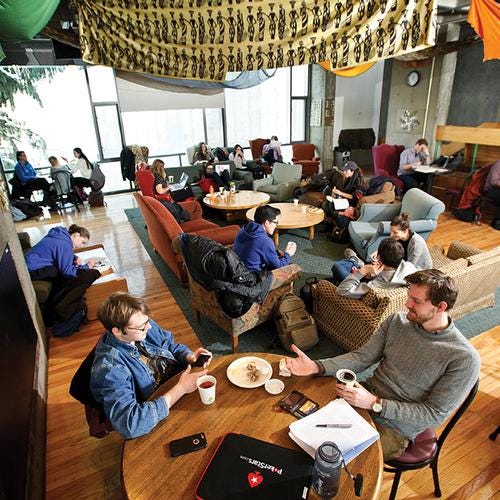
On Monday, Feb. 8, right before the McEwen Dining Hall lunch rush, students watched in terror as teams of facilities workers wheeled out Opus’s plush, patterned armchairs and metal study tables. The horror grew when the space started to fill again: Operation Adirondack Chair had spread to Opus and the Darkside sanctuary had become the latest victim.
This reaction may seem a little dramatic, and in a lot of ways, it really is. It is silly to describe this furniture incident as a horrific event. But for many students, nothing at that moment could have been more important. Eric Kopp ’22, Student Representative on the COVID-19 Task Force, described in his Student Assembly statement how a student was quoted saying that “it feels like we defaulted on our mortgage and the bank has come to seize all of our assets.” The removal of the Opus chairs without consulting students nor Opus staff was a blatant display of the Administration’s apathy towards student needs and desires.
Soon after the removal of the furniture, students began to take action. By Tuesday morning, a petition entitled “Bring Back Opus Furniture” began to circulate. Overall, it gained 231 signatures in the two days that it was active, advocating for “the right to comfort and a social environment.” Signers expressed frustration and sadness over the decision, made without student consultation, which negatively impacted the community that the Opus staff fosters. Lizzie Ely ’21 and Molly Symmonds ’23, co-creators of the petition, expanded on Opus’s importance to the campus community. For Ely, Opus is the only place where “it feels a little bit like you still have a life.” Symmonds went further, saying that the cafe acted as her “living room,” and the substitution was “crushing her spirit.” The two organized to have friends sign the petition, write passionate emails to the admin, and fill President David Wippman’s office hours with Opus “activists.”
The response from the Administration was anything but transparent. Multiple sources that contacted them were told that the removal was carried out because cloth surfaces were too hard to clean. However, not only does the Centers for Disease Control and Prevention, who Hamilton models its actions after, state that surfaces “are not thought to be the main way the virus spreads,” but there are cloth chairs all throughout campus which have not been removed or replaced. Both Kopp and Symmonds remark that Hamilton staff present for the removal blamed students’ actions, saying “this is what you get when you don’t follow the rules.” In his email to the COVID-19 Task Force, Student Assembly, and relevant administrators, Kopp stressed that taking away common spaces such as Opus “create a situation where ‘safety’ is merely a facade,” driving students into unmasked residence halls.
Early Wednesday morning, about 36 hours after the fateful lunch “invasion,” the chairs and tables were returned. Thanks to the work of Kopp, Symmonds, and Ely, the furniture was restored.
Ely says that “the beauty of college life is that you can fight for things,” especially during this COVID-restricted year where the students have lost much of their agency. “Students are looking for something to fight for,” she stated. Although this may be a silly cause, it feels good to have a “positive contribution” to our campus society when the world has been put on hold.
In both of the interviews that I conducted (in Opus, no less), Ely and Symmonds stressed the unimportance of this issue. What I mean by this is they understood that furniture is not the most important issue on this campus. Ely laments that students have been “demanding things that are important” such as anti-racist action and divestment from fossil fuels, and that “these requests go unanswered.” The success of the Students Against Furniture Removal campaign relied entirely on the simplicity of the fix. For serious issues, the Administration covers their ears or makes more advisory councils while dismissing student voices. While being a relatively trivial issue, the Opus furniture removal points to the Administration’s obvious distrust of unsupervised student behavior, but more importantly, continued apathy towards students’ needs. Clearly, they have the ability to listen and respond quickly to student demands. The question now is: how can we make them care about the more important issues?
















